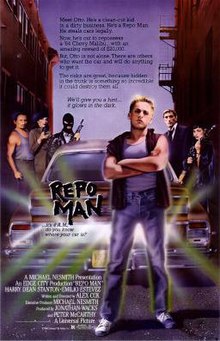
Back Repo Man Welsh Repo Man German Repo Man Spanish Repo Man Basque شرخر (فیلم ۱۹۸۴) Persian Repo Man Finnish La Mort en prime French Repo Man (scannán) Irish Repo Man (film) ID Repo Man - Il recuperatore Italian
| Repo Man | |
|---|---|
 Theatrical release poster | |
| Directed by | Alex Cox |
| Written by | Alex Cox |
| Produced by | |
| Starring | |
| Cinematography | Robby Müller |
| Edited by | Dennis Dolan |
| Music by |
|
Production company | Edge City Productions |
| Distributed by | Universal Pictures |
Release date |
|
Running time | 92 minutes[1] |
| Country | United States |
| Languages |
|
| Budget | $1.5 million[2] |
| Box office | $3.7 million[3] |
Repo Man is a 1984 American science fiction black comedy film written and directed by Alex Cox in his directorial debut. It stars Harry Dean Stanton and Emilio Estevez, with Tracey Walter, Olivia Barash, Sy Richardson, Vonetta McGee, Fox Harris, and Dick Rude among the supporting cast. Set in Los Angeles, the plot concerns a young punk rocker (Estevez) who is recruited by a car repossession agency and gets caught up in the pursuit of a mysterious Chevrolet Malibu that might be connected to extraterrestrials.
A satire of America under the Reagan administration, consumerism and the Atomic Age, Repo Man was developed by Cox in partnership with his fellow film school graduates from UCLA, independent producers Jonathan Wacks and Peter McCarthy. His inspiration for the film came from his own experiences working with repossession agent Mark Lewis. Originally conceiving of it as a road movie, Cox reconfigured the story to take place mostly in Los Angeles to maintain its budget. Michael Nesmith of The Monkees came on board the project as an executive producer, and secured a negative pickup deal with Universal Pictures. Principal photography ran through summer 1983, during which Cox encouraged improvisation from the cast; the film's ending notably differed from what had originally been written.[4][5][6] The soundtrack, headlined by a main theme composed and performed by Iggy Pop, is noted as a snapshot of 1980s hardcore punk;[7] Cox wanted the music to underscore the life of repo men.[7][8]
Despite a troubled initial release due to Universal's skepticism towards the film's commercial viability, Repo Man received widespread acclaim, and was deemed by critics to be one of the best films of 1984.[9][10] It has since gained a cult following, particularly surrounding Cox's re-edited version of the film for television due to its deliberate inclusion of surreal overdubs to replace profanity.[5] A stand-alone sequel based on an unproduced screenplay by Cox, Waldo's Hawaiian Holiday, was published as a graphic novel in 2008, while a spiritual successor, Repo Chick, was released in 2009.
- ^ "REPO MAN (18)". British Board of Film Classification. September 16, 1984. Retrieved July 31, 2013.
- ^ The Criterion Collection 2013 release booklet, pg. 51
- ^ Repo Man at Box Office Mojo Retrieved July 31, 2013
- ^ "Repo Man (1984)". AFI. Retrieved March 11, 2020.
- ^ a b "The Weirdest Things You Never Knew About The Making Of Repo Man". Gizmodo. December 19, 2014. Retrieved March 11, 2020.
- ^ Ciampaglia, Dante A. (August 21, 2015). "15 Atomic Truths About Repo Man". Mental Floss. Retrieved March 11, 2020.
- ^ a b Burks, Brian. "Repo Man (soundtrack)". Creative Noise. Retrieved April 23, 2002.
- ^ "REPO MAN – Music From The Original Motion Picture Soundtrack". Repo Man Film. Retrieved January 24, 2019.
- ^ "The 10 Best Movies of 1984". Film.com. Archived from the original on December 4, 2008. Retrieved May 21, 2010.
- ^ "The Best Movies of 1984 by Rank". Films101.com. Retrieved May 21, 2010.